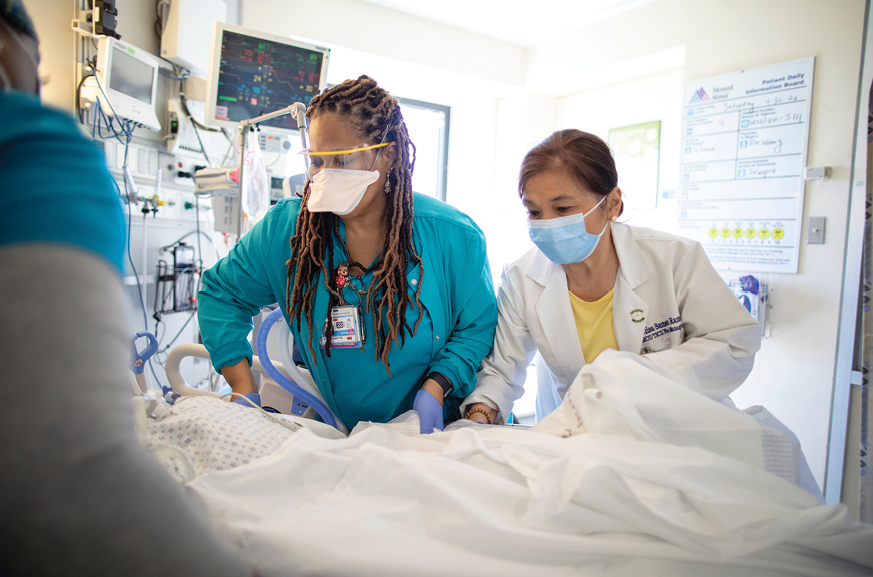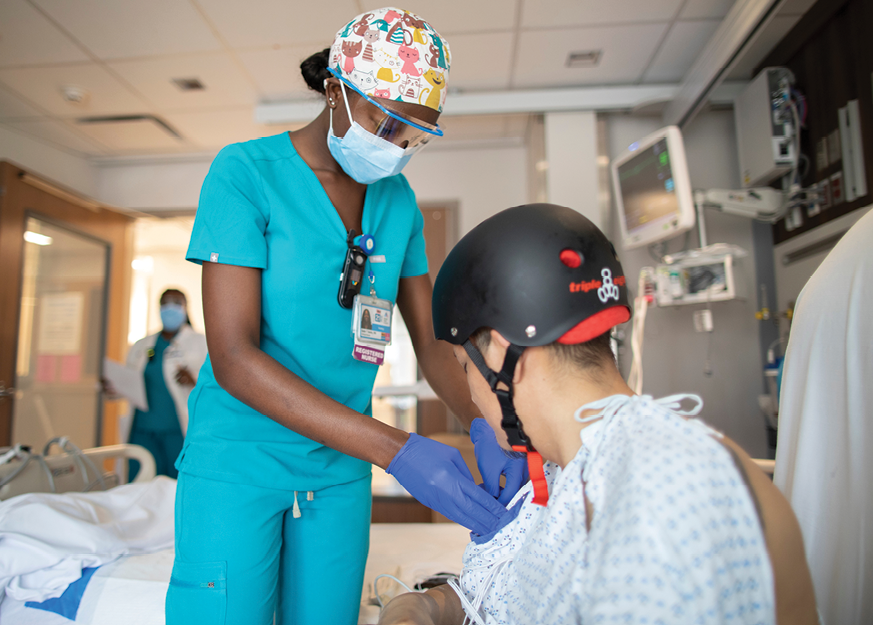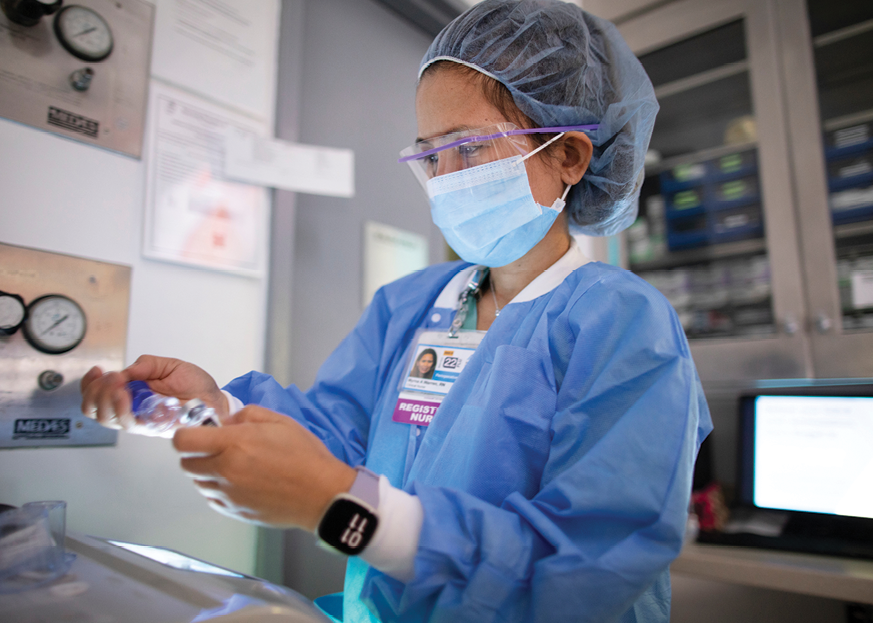- Home
- Media Kit
- MediaJet
- Current Issue
- Past Issues
- Ad Specs-Submission
- Ad Print Settings
- Reprints (PDF)
- Photo Specifications (PDF)
- Contact Us
![]()
ONLINE
![]()
ONLINE

Bedside is the
Best Side
Editors’ Note
Dr. Beth Oliver is responsible for the practice of nursing across the Health System and collaborates with the senior executive team as well as Chief Nursing Officers throughout Mount Sinai. For more than 28 years, Dr. Oliver has been a transformational cardiac nurse leader at Mount Sinai, most recently serving as Senior Vice President of Cardiac Services for the Health System. In this role, she led cardiovascular service line strategy and operations for the Health System while also ensuring the delivery of quality care to Mount Sinai Heart patients. In addition to her Mount Sinai leadership roles, Dr. Oliver has led numerous cardiovascular health-related community outreach programs in partnership with the American Heart Association. In July 2018, Dr. Oliver was appointed President of the American Heart Association’s Board of Directors in New York City, becoming the first nurse to hold the position of Board President. She received her MS from Columbia University and her DNP from Case Western Reserve University. Dr. Oliver is a Fellow of the American Academy of Nursing.
Institution Brief
Mount Sinai Health System (mountsinai.org) encompasses the Icahn School of Medicine at Mount Sinai and eight hospitals, as well as a large and expanding ambulatory care network. The eight hospitals – Mount Sinai Beth Israel, Mount Sinai Brooklyn, The Mount Sinai Hospital, Mount Sinai Queens, Mount Sinai St. Luke’s, Mount Sinai South Nassau, Mount Sinai West, and New York Eye and Ear Infirmary of Mount Sinai – have a vast geographic footprint throughout the New York metropolitan region. The Mount Sinai Hospital is ranked number 14 in the nation by U.S. News & World Report and ranked in the top 20 nationally in eight medical specialties in the 2019-20 Best Hospitals guidebook. The New York Eye and Ear Infirmary of Mount Sinai is also ranked nationally in ophthalmology.

Nurses at work in the Mount Sinai Health System
(above and following)
How do you describe Mount Sinai Health System’s nursing culture?
Mount Sinai Health System’s nursing culture is built on collaboration. It’s our unique strength. During COVID, this was more apparent than ever. Titles didn’t matter – everyone jumped in and worked together. If there was one silver lining from the challenges during the pandemic, it was how well we worked together. Furthermore, I’ve recognized that we need to continue to have leadership accessible to all nurses, and I’ve started a series called Breakfast with Beth. We ask nurses to come for breakfast to hear from the front line – what we are doing well and what do we need to improve. Communication is key.
Will you discuss your role and areas of focus?
I am responsible for the practice of nursing across the health system. I collaborate with the health system’s senior executive team, our executive cabinet of nurse leaders, which I instituted when I was promoted in 2020, as well as the chief nursing officers throughout Mount Sinai. My top three priorities are to ensure the safety and quality of care for our patients, transforming the care we provide, and decreasing the overall costs of that care. These priorities have improved our patients’ overall experience. I also am tasked to develop and maintain Mount Sinai’s national reputation for excellence in nursing services. I participate in creating the health system’s strategic plan – setting annual and long-term performance goals with our leadership team, and I leverage Mount Sinai’s nursing excellence to advance the achievement of these strategic goals, optimize clinical outcomes, enhance employee engagement, and promote a best-in-class patient experience.
Will you provide an overview of nursing at Mount Sinai?
We have a cabinet of nurse executives that form our operational and reputational nursing strategy for the health system. The cabinet includes executive positions in areas that include finance and operations as well as the dean of our nursing school. We then have chief nursing officers who oversee nursing at our eight hospitals as well as ambulatory care. From there, we have nursing leaders that oversee strategic service lines and programs across the health system. Every nurse’s mission, no matter their titles, is defined in our nursing strategic plan. That mission includes a commitment to improve the patient experience, to build a culture of safety and quality through a team-based model, and to create value-based care.

Where do you see the greatest opportunities to grow nursing excellence?
Our greatest opportunities are really found with our new nurses. We have placed a priority on building a bridge from our own extraordinary nursing school to our hospitals. We want to make sure our new nurses feel safe and prepared to care for our patient population. Simulation is key in training, and our new state-of-the art location for our nursing school offers bedside simulation training and will soon offer operating room simulation training. As nurses have retired, we want to make sure new nurses feel comfortable so we can recruit and retain them. Another recruitment and retention tool that we’ve created is an upward mobility program that allows nurses with Associate’s Degrees to earn their RN-BSN on the job, so they take classes at our nursing school to advance their degree while working in one of our hospitals.
What is the role of nursing excellence across the Health System to strengthen cohesion, identity, and commitment?
Mount Sinai Nursing places a high priority level on diversity, equity, and inclusion. By doing so, we are able to strengthen our teams, leverage and share new ideas, and deliver excellent patient-centered care. We are committed to also highlighting nursing excellence within our health system and externally to recognize our nurses’ crucial and diverse roles here and in shaping nursing care into the future.
You were deeply engaged in Mount Sinai Health System’s pandemic response. How proud are you to see the way Mount Sinai Health System led during this uncertain time and the resilience that was displayed by its nurses at all levels of the organization?
It’s something that I’ll never forget. It’s something that has shaped me. I was extremely proud of our nurses’ strength and resilience across the health system. We worked really collaboratively with our colleagues in emergency medicine to triage an almost impossible crisis, and we were able to shift and be agile. Our teams assisted across departments and even across all of our sites.
One success story was the work we did to help our hospital in Brooklyn, which was in one of the hotspots during the first wave of the pandemic. We sent a nursing leadership team into that hospital, and they righted the ship. Everybody just rose to the occasion as we were hit with thousands of very sick patients.

Do you feel that there are strong opportunities for women in leading roles in the profession?
Historically nursing was a women’s profession, so naturally women had a little less of a glass ceiling to take on leadership roles. Now, the profession continues to diversify, and we have a growing male cohort. Moving forward, I think there is tremendous opportunity since COVID as we continue to shift to a community care model and go into the home. With these community and home-based care models, you will see nurses leading healthcare teams that historically have been led by doctors. As nursing is elevated as a profession, there are more and more leadership roles available. At Sinai alone, we created our executive cabinet above our chief nursing officer title, which is a unique opportunity for growth in our profession.
What advice do you offer to young people interested in a career in nursing?
My advice is that it is the best job. Our catch phrase is “Bedside is the Best Side,” but there are many roles beyond the bedside to explore. I also advise people to look at all of the diverse roles that a nurse can do – for example, research, education, informatics. And within bedside roles, there are so many different specialties. There’s something for everyone. With our scheduling flexibility, a nurse has a tremendous opportunity to prioritize work-life balance by working three days a week. It can provide you with the opportunity for much needed downtime, or the time to pursue your other interests and passions.
Did you always know that you wanted to pursue a career in nursing and what has made the profession so special for you?
I knew that I wanted to be a nurse since I was 14 years old. I loved the idea of being able to help people. We make a difference every single day. Nursing someone back to health should not be minimized. The ability to do what Florence Nightingale did is more important than ever. Nurses spend more time at the bedside than anyone. We give our patients the power of the human spirit. Beyond medicine, we get them up and walking to make progress in their healing. We talk to their family. We educate. When a patient comes to us, their care and healing is in our hands and it’s an amazing honor to care for them. It’s a special profession, and I work hard every day to ensure it’s well respected.![]()